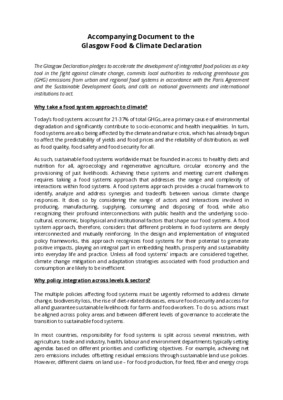Backup_JSC_2C - GlasgowFoodClimate_addition — original pdf
Backup

Accompanying Document to the Glasgow Food & Climate Declaration The Glasgow Declaration pledges to accelerate the development of integrated food policies as a key tool in the fight against climate change, commits local authorities to reducing greenhouse gas (GHG) emissions from urban and regional food systems in accordance with the Paris Agreement and the Sustainable Development Goals, and calls on national governments and international institutions to act. Why take a food system approach to climate? Today’s food systems account for 21-37% of total GHGs, are a primary cause of environmental degradation and significantly contribute to socio-economic and health inequalities. In turn, food systems are also being affected by the climate and nature crisis, which has already begun to affect the predictability of yields and food prices and the reliability of distribution, as well as food quality, food safety and food security for all. As such, sustainable food systems worldwide must be founded in access to healthy diets and nutrition for all, agroecology and regenerative agriculture, circular economy and the provisioning of just livelihoods. Achieving these systems and meeting current challenges requires taking a food systems approach that addresses the range and complexity of interactions within food systems. A food systems approach provides a crucial framework to identify, analyze and address synergies and tradeoffs between various climate change responses. It does so by considering the range of actors and interactions involved in producing, manufacturing, supplying, consuming and disposing of food, while also recognizing their profound interconnections with public health and the underlying socio- cultural, economic, biophysical and institutional factors that shape our food systems. A food system approach, therefore, considers that different problems in food systems are deeply interconnected and mutually reinforcing. In the design and implementation of integrated policy frameworks, this approach recognizes food systems for their potential to generate positive impacts, playing an integral part in embedding health, prosperity and sustainability into everyday life and practice. Unless all food systems’ impacts are considered together, climate change mitigation and adaptation strategies associated with food production and consumption are likely to be inefficient. Why policy integration across levels & sectors? The multiple policies affecting food systems must be urgently reformed to address climate change, biodiversity loss, the rise of diet-related diseases, ensure food security and access for all and guarantee sustainable livelihoods for farm- and food-workers. To do so, actions must be aligned across policy areas and between different levels of governance to accelerate the transition to sustainable food systems. In most countries, responsibility for food systems is split across several ministries, with agriculture, trade and industry, health, labour and environment departments typically setting agendas based on different priorities and conflicting objectives. For example, achieving net zero emissions includes offsetting residual emissions through sustainable land use policies. However, different claims on land use – for food production, for feed, fiber and energy crops and for urban development in the face of a growing population – are difficult to reconcile in the absence of overarching objectives and cross-cutting policies for food systems. In addition, strategies to reduce food loss and waste could be significantly improved by an integrated policy approach, allowing for responses that could simultaneously address multiple technical gaps (e.g. improved harvesting, packaging and refrigeration) as well as behavioural changes (e.g. through labelling and education) and market failures (e.g. through redistribution of food surplus and lowered prices on nearly expired food). There are also important inconsistencies between governance levels. The majority of sustainable food system innovations are occurring at the local and regional levels. However, limited international and national government recognition, mandate and support for city and incentivize this type of regional food system policies and partnerships fails to experimentation. For example, the MUFPP and C40 declarations have already recognized the need for coordination between governance levels. However, this has not been met with a clear commitment from national governments, nor have they paid sufficient attention to food systems in their nationally-determined contributions (NDCs) under the Paris Agreement. The development of integrated food policies would serve to correct these oversights, particularly through multi-actor and multi-level governance mechanisms. However, governance mechanisms for cross-sectoral work and inclusive priority-setting are generally lacking, as are the opportunities for a multi-level exchange to share best practices and evaluation tools between the local, regional and national authorities seeking change. The most progressive food policies have often been built through participatory approaches and multi-stakeholder platforms. Integrated food policies can build on these more democratic and multi-sector governance approaches by setting a long-term vision; establishing overarching objectives for the whole food system; realigning the various sectoral policies that affect production, processing, distribution and consumption; building around local-level experimentation; and involving all food system stakeholders on equal footing – including farmers, youth, food entrepreneurs, civil society groups, and public authorities to allow for a sustainable and just transition. Why a prominent role for local actors? The majority of sustainable food system innovation and change are occurring at the local and regional levels. However, limited international and national government recognition, mandate and support for city and regional food system policies and partnerships fails to incentivize effective scaling and extension of this vital action. Cities and regions are already leading the way in pioneering integrated food policies and strategies to drive positive food system change at a local level. This includes food waste reduction schemes; healthy and sustainable food procurement for public canteens; public campaigns to encourage behavioural change towards healthy diets, including the reduction of industrial meat and dairy consumption; the creation of urban gardens, agricultural parks, incubator farms, regional food hubs, and farmers markets; frameworks to support short supply chain and social and solidarity economy initiatives; strengthening agroecological development plans; integrated territorial and urban food planning; strengthening urban-rural linkages; or the development of pesticide-free and GMO-free districts, bio-districts and organic regions.